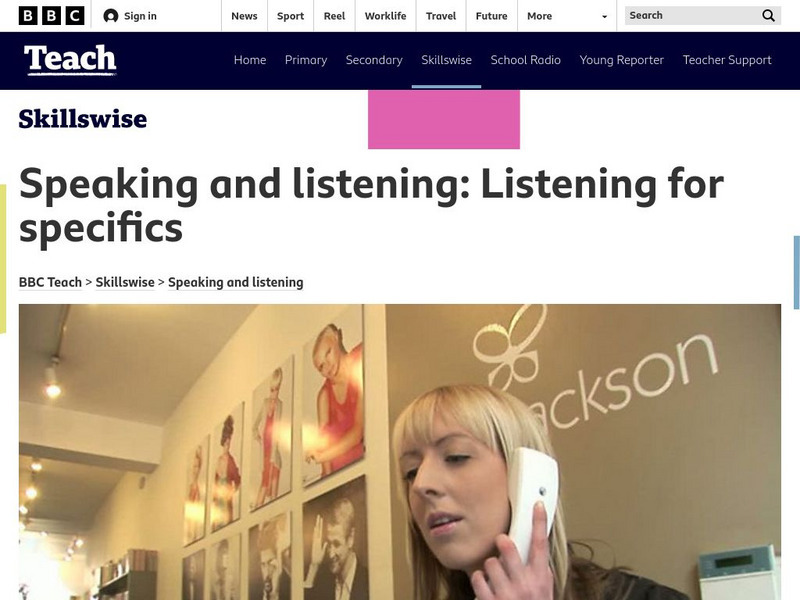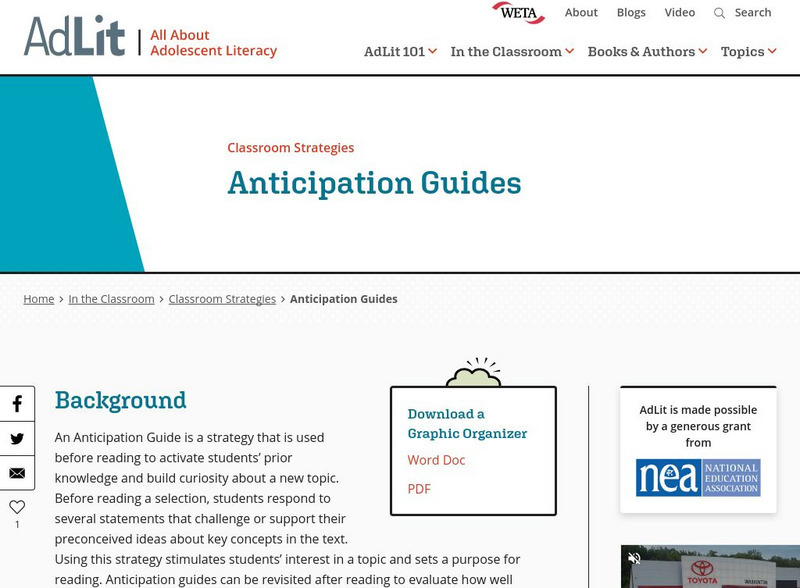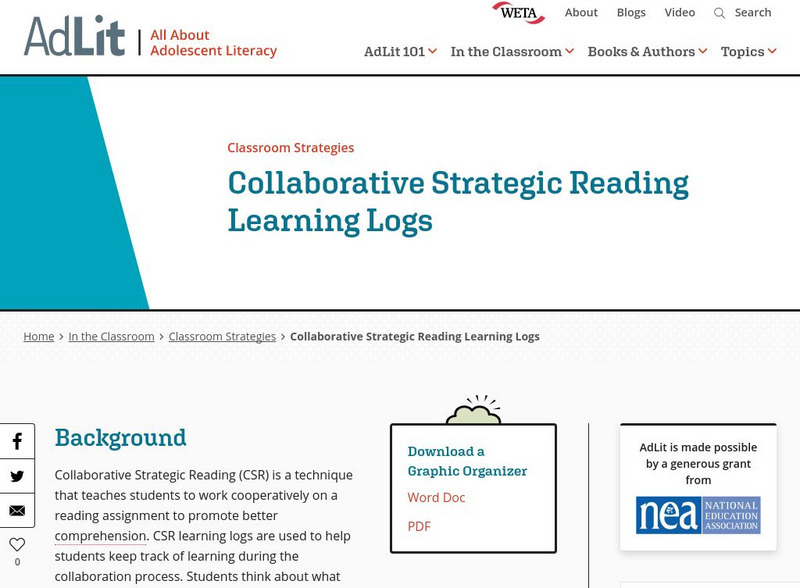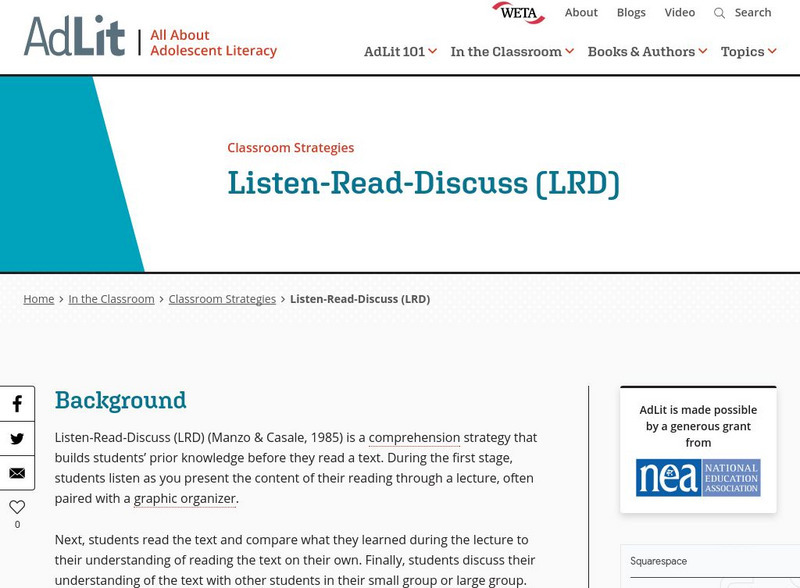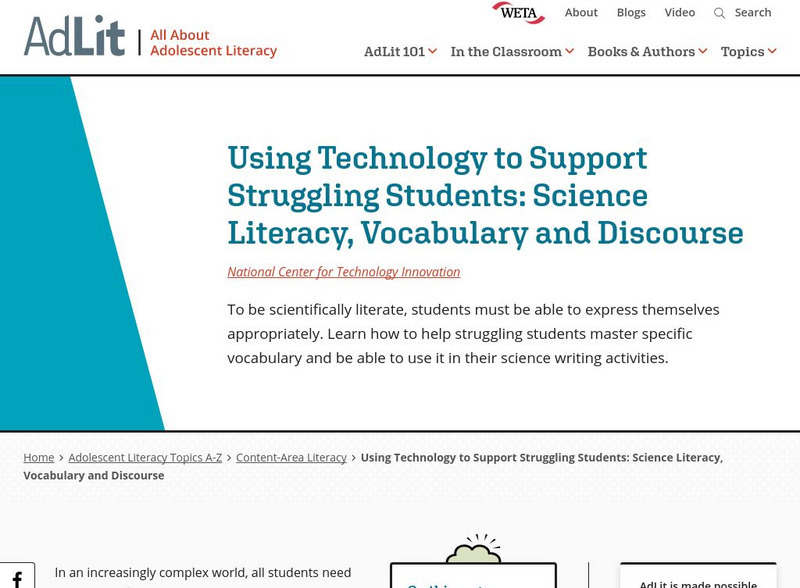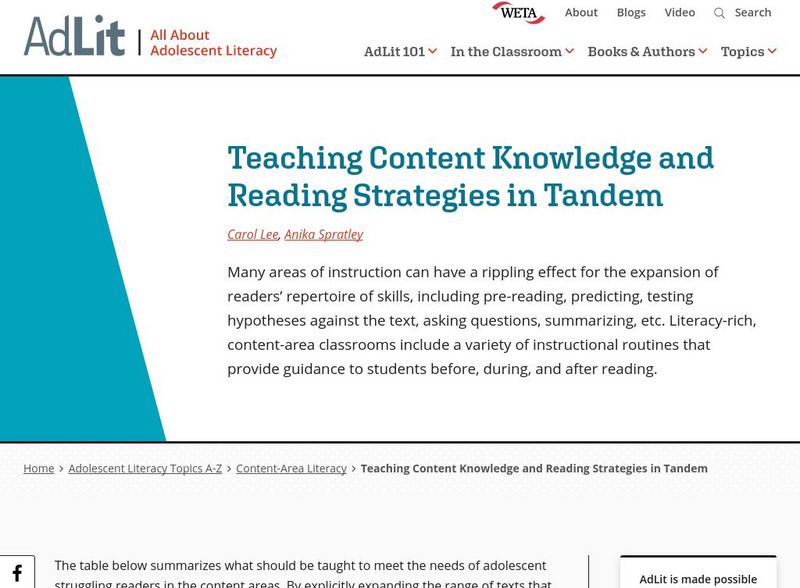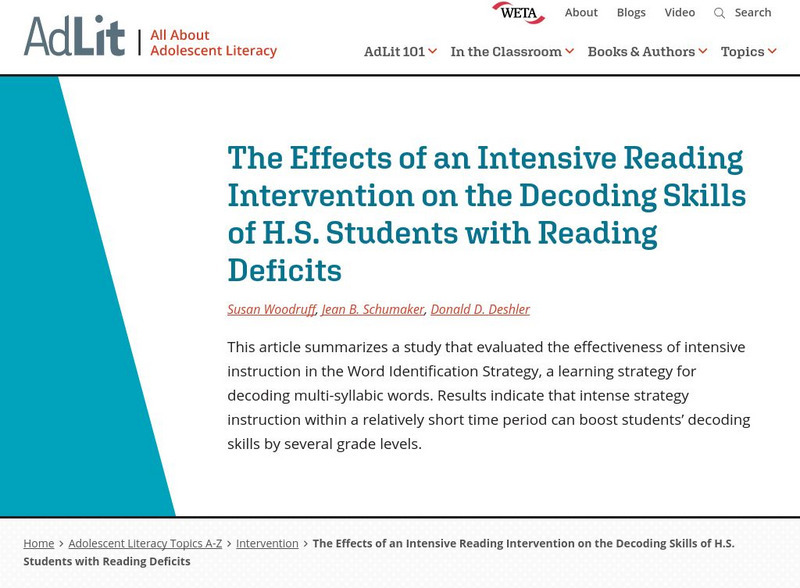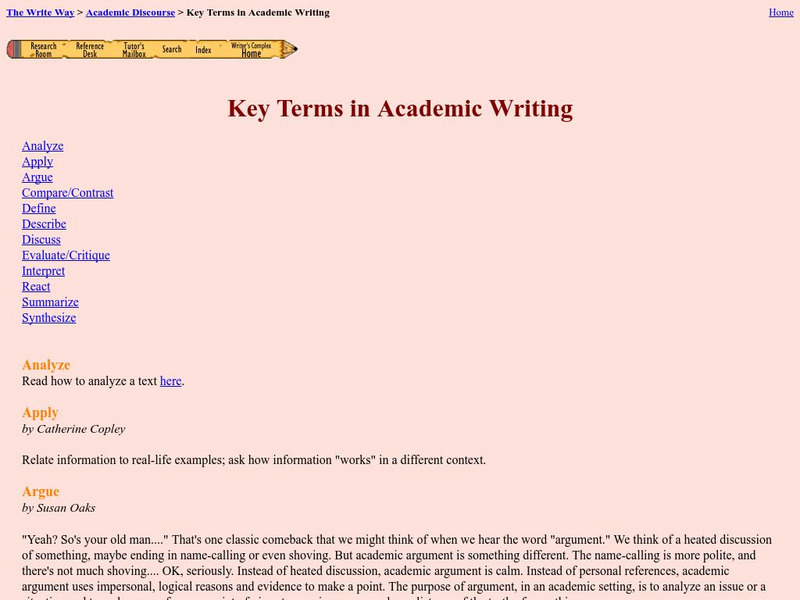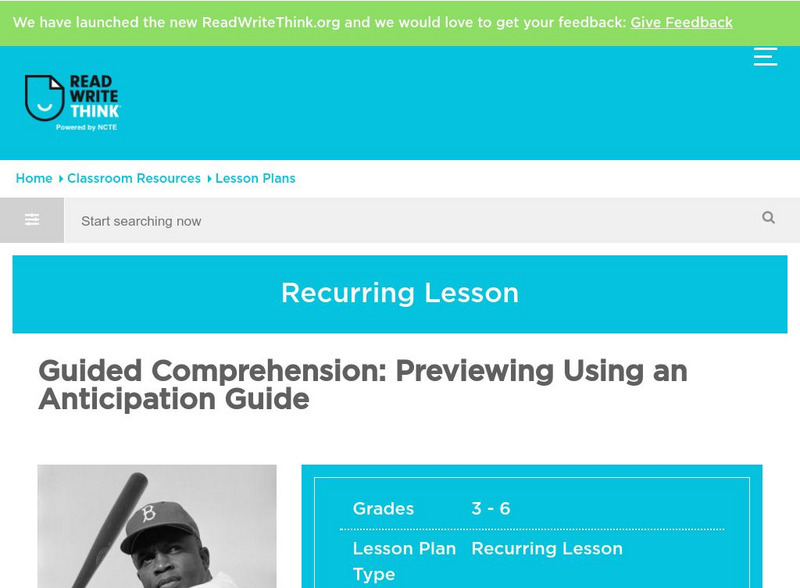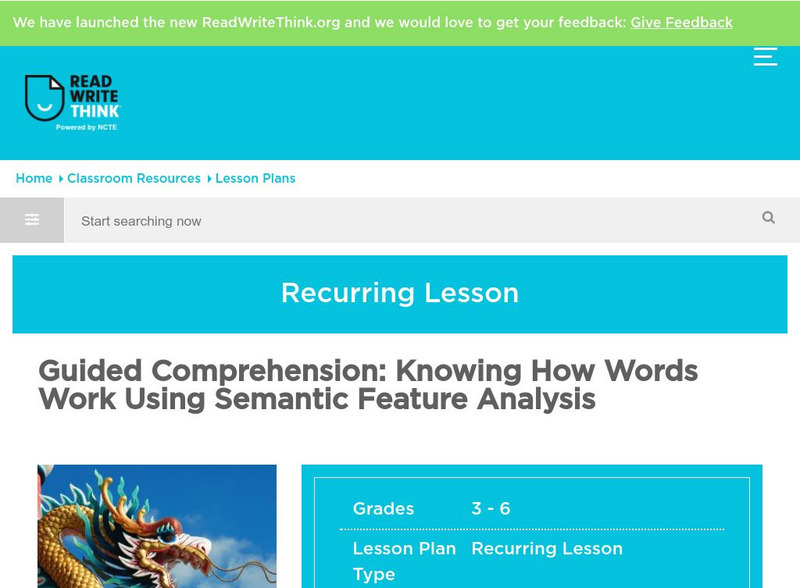Reading Rockets
Reading Rockets: Teaching Reading: Classroom Strategies
A collection of effective, research-based classroom strategies to help build and strengthen literacy skills in print awareness, phonological awareness, phonics, fluency, vocabulary, comprehension, and writing.
BBC
Bbc Skillswise: Listening for Specific Information
This tutorial presents a video, factsheets, and worksheets for learning how to listen for and understand information. It looks at how to handle different situations, e.g., arranging a delivery, asking questions about a product before...
AdLit
Ad lit.org: Classroom Strategies: Anticipation Guides
An Anticipation Guide is a strategy that is used before reading to activate students' prior knowledge and build curiosity about a new topic. Before reading a selection, students respond to several statements that challenge or support...
AdLit
Ad lit.org: Classroom Strategies: Collaborative Strategic Reading Learning Logs
Collaborative Strategic Reading (CSR) is a technique that teaches students to work cooperatively on a reading assignment to promote better comprehension. CSR learning logs are used to help students keep track of learning during the...
AdLit
Ad lit.org: Classroom Strategies: Listen Read Discuss (Lrd)
Listen-Read-Discuss (LRD) (Manzo & Casale, 1985) is a comprehension strategy that builds students' prior knowledge before they read a text. During the first stage, students listen as you present the content of their reading through a...
AdLit
Ad lit.org: Explicit Comprehension Strategy Instruction
Use explicit strategy instruction to make visible the invisible comprehension strategies that good readers use to understand text. Support students until they can use the strategies independently. Recycle and re-teach strategies...
AdLit
Ad lit.org: Extended Discussion of Text Meaning and Interpretation
Teachers should provide opportunities for students to engage in high-quality discussions of the meaning and interpretation of texts in various content areas as one important way to improve their reading comprehension.
AdLit
Ad lit.org: Five Areas of Instructional Improvement to Increase Academic Literacy
How can content-area, non-reading-specialist teachers contribute to academic literacy? They can incorporate these five techniques throughout their lessons: (1) provide explicit instruction and supported practice in effective...
AdLit
Ad lit.org: Improve Performance on Reading Comprehension Tests
This article describes some of the thought processes that can help students perform well on standardized tests of reading comprehension. It includes two reading passages along with sample test questions that call on skills that eighth...
AdLit
Ad lit.org: Using Technology to Support Struggling Students: Vocabulary
To be scientifically literate, students must be able to express themselves appropriately. Learn how to help struggling students master specific vocabulary and be able to use it in their science writing activities.
AdLit
Ad lit.org: Teaching Content Knowledge and Reading Strategies in Tandem
Many areas of instruction can have a rippling effect for the expansion of readers' repertoire of skills, including pre-reading, predicting, testing hypotheses against the text, asking questions, summarizing, etc. Literacy-rich,...
AdLit
Ad lit.org: Effects of Intensive Reading Intervention of Decoding Skills
This article summarizes a study that evaluated the effectiveness of intensive instruction in the Word Identification Strategy, a learning strategy for decoding multi-syllabic words. Results indicate that intense strategy instruction...
SUNY Empire State College
Key Terms in Academic Writing: Key Terms in Academic Writing
This site offers a clear definition of what is expected in a definition essay. It also provides a link to a sample paper, with instructor's comments, as well as a link to the Purdue University On-Line Writing Lab.
Writing Fix
Writing Fix: Purposeful Paragraphs on Memorable Teachers [Pdf]
How can we use questioning to create lead sentences and details in order to create a purposeful paragraph? This PDF lesson offers an organization technique that asks young scholars to pre-plan paragraphs by brainstorming interesting...
Writing Fix
Writing Fix: Teaching Students to Compose a Power Paragraph [Pdf]
This PDF lesson, POWER PARAGRAPH, focuses on analysis and will also help students to understand structure in a paragraph. The "power" concept teaches the students to organize their sentences according to different levels of importance....
InterLink Language Centers
Interlink Language Centers: Reading Exercises Science
An interactive exercise for students to use while developing an understanding of how to read scientific informational texts. The text is presented one paragraph at a time and difficult vocabulary words are defined as footnotes. Then...
Harvard University
Harvard University: Games With Words: The Communication Game
A study in communication where participants follow comprehension and logic clues to determine which statements are true and false.
Other
Increased Comprehension With the Use of Imagery
Designed for adult learners, this literacy lesson could easily be used in the high school or middle school classroom. Some handouts are included, but some material must be found in a newspaper or magazine.
Other
Eduscapes: Themes & Literature Circles
This site provides guidance in creating literature circles based on cross-curricular themes that will help to improve literacy. The site emphasizes both theory and practice, with lots of practical suggestions.
ReadWriteThink
Read Write Think: Questioning a Comprehension Strategy for Small Group Reading
Contains plans for three lessons about asking the right questions while reading. After the teacher explains the difference between factual and inferential questions, students practice using them in small-group guided reading. In addition...
ReadWriteThink
Read Write Think: Guided Comprehension: Previewing
This lesson introduces students to the comprehension technique of previewing. Students use anticipation guides to preview and predict stories and work in small groups.
ReadWriteThink
Read Write Think: Guided Comprehension: Making Connections
Lesson introduces young scholars to the strategy of making connections. Students learn the three types of connections using a double-entry journal. A good resource for teachers.
ReadWriteThink
Read Write Think: Guided Comprehension: Semantic Analysis
Lesson introduces learners to comprehension of knowing how words work. Students learn semantic feature analysis and examine folktales, myths, and fables using this analysis to better understand these terms and texts.
ReadWriteThink
Read Write Think: Guided Comprehension: Monitoring
Online lesson introduces students to the concept of monitoring. Students learn the INSERT technique, which allows them to monitor their thinking and comprehension using a coding system.



